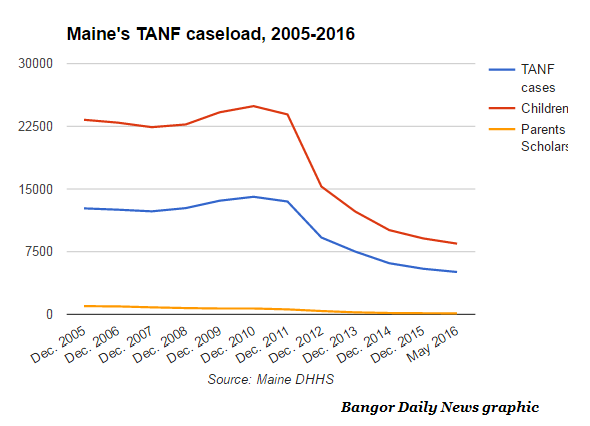In a painstakingly detailed investigation, the Bangor Daily News (BDN) has pulled back the curtain, exposing the LePage administration’s maneuvering to undermine the federally funded Temporary Assistance to Needy Families (TANF) program, “the federal government’s primary mechanism for delivering cash assistance and work support to low-income families with children.” The BDN found that the administration’s effort includes spending $7.8 million “in ways that run afoul of federal law.” It also revealed that LePage’s attempt to reinterpret TANF has come at the expense of needy families including nearly 16,000 Maine children.
The federal government appropriates more than $78 million annually for TANF in Maine. The BDN found that rather than spend a substantial portion of these funds as federal law intends, the Maine Department of Health and Human Services (DHHS) has “quietly” set aside $110 million in unspent TANF funds (more than the balance in the state’s “rainy day” fund) and proposed using some of this the money instead on programs for seniors and the disabled.
The BDN adds that the federal statute governing TANF expenditures “forbids states from taking a pool of funds earmarked for one population (low-income families with kids) and spending it on an entirely different demographic (elderly and disabled residents).”
More to the point, the BDN found that since DHHS implemented a LePage rule change to limit to five years the lifetime amount of time people (including children) could receive TANF benefits, the number of Maine TANF cases fell from 13,320 to 5,195. The number of Maine children receiving TANF benefits plummeted from more than 24,500 to 8,500. To put that in perspective the BDN noted:
Even as the economy has begun to recover, statewide poverty rates haven’t improved. Child poverty is still higher than it was before the recession, and extreme poverty among the state’s children — those living in families with incomes at half the federal poverty level — has grown. The newly released 2016 KIDS COUNT rankings on child well-being compiled by the Annie E. Casey Foundation show Maine slipping five places in one year — to 17th from 12th.
The LePage administration has repeatedly argued that its welfare reforms are aimed at “reprioritizing Maine’s welfare system to best serve our neediest elderly and disabled neighbors.” Rather than cutting programs that lift Maine families and children out of poverty, the governor would do better to support seniors and the disabled by revisiting his massive tax cuts that mostly benefit the wealthy.



